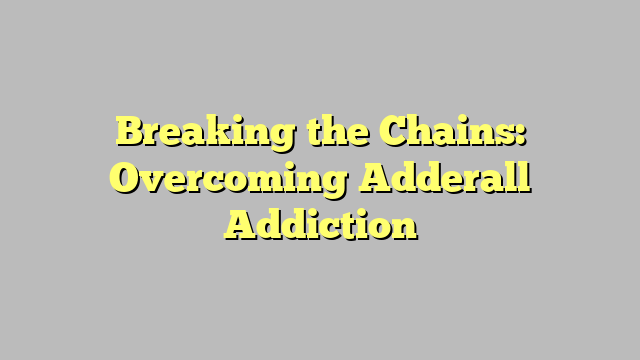Adderall addiction can be a challenging and complex struggle for those who find themselves caught in its grasp. This prescription stimulant, commonly used to treat Attention Deficit Hyperactivity Disorder (ADHD), has garnered a reputation for its potential for misuse and addiction. What may start as a way to enhance focus and productivity can quickly spiral into a dependency that can have detrimental effects on one’s health and well-being. As the prevalence of Adderall prescriptions has risen, so too has the risk of addiction, making it vital to address this issue head-on and provide support for those seeking to break free from its hold.
Recognizing the Signs
Adderall addiction can manifest in various ways, affecting both physical and mental well-being. One common sign is an increased tolerance to the drug, leading individuals to take higher doses to achieve the same effects. Additionally, frequent cravings for Adderall and an inability to control or reduce its use are indicative of a developing addiction.
Physical symptoms such as insomnia, rapid heart rate, and weight loss can also signal an Adderall addiction. These effects may be accompanied by mood swings, irritability, and agitation. In some cases, individuals may experience paranoia or hallucinations as a result of prolonged Adderall abuse.
Social and behavioral changes can be telling signs of Adderall addiction as well. Withdrawal from usual activities, neglect of responsibilities, and secrecy about Adderall use are all red flags. Loved ones may notice a shift in personality or behavior, including increased isolation or lying about drug consumption.
Seeking Help
Adderall Addiction
When facing Adderall addiction, seeking help is a crucial step towards recovery. It is important to remember that you are not alone in this journey. You can reach out to trusted friends, family members, or support groups to provide you with the encouragement and guidance you need.
Talking to a healthcare professional is an essential part of overcoming Adderall addiction. A doctor or therapist can help assess your situation and develop a personalized treatment plan for you. They can also provide valuable resources and support to assist you in managing withdrawal symptoms and cravings.
Support groups dedicated to addiction recovery can be a source of strength and motivation during your journey to break free from Adderall addiction. Connecting with others who understand what you are going through can provide comfort and empowerment. Sharing experiences, insights, and coping strategies with peers can be invaluable in overcoming challenges and staying committed to your recovery.
Maintaining Recovery
It is crucial to surround yourself with a strong support system while navigating the path to recovery. Engaging with understanding friends and family members who uplift and encourage you can make a significant difference in your journey towards breaking free from Adderall addiction. Seek out support groups or therapy sessions where you can openly share your struggles and receive guidance from individuals who have walked a similar path.
Incorporating healthy habits into your daily routine can aid in maintaining your recovery. Establishing a consistent exercise regimen not only benefits your physical health but also contributes to a positive mindset. Prioritize nutritious meals to fuel your body and mind, as proper nutrition plays a key role in overall well-being. Implement relaxation techniques such as mindfulness meditation or yoga to help alleviate stress and promote inner peace.
Set achievable goals and celebrate your milestones along the way. Recognize the progress you have made and acknowledge the strength it took to overcome obstacles. Stay committed to practicing self-care and prioritize activities that bring joy and fulfillment. By staying actively engaged in your recovery journey, you empower yourself to stay resilient in the face of challenges and continue moving forward towards a healthier, Adderall-free life.

